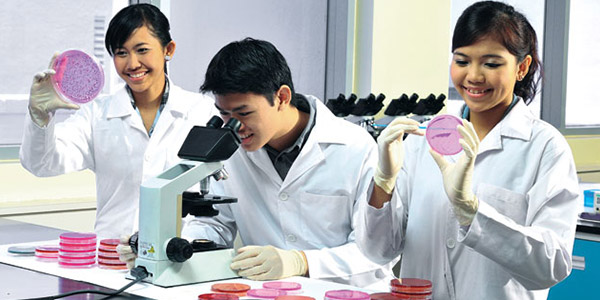Diploma In Biotechnology
Diploma in Biotechnology is an emerging technology. Which involves the knowledge from life sciences along with inputs from the chemical engineering, instrumentation, information technology etc. For the application in agriculture, food industry, Medicine, Pharmaceuticals and bulk chemical industries and environment conservation. The syllabus has been approved by BTE and BIOCON – a major Biotech Industry.
Diploma in Biotechnology is developed from biology. Traditionally, classical biotechnology involves the process and products of fermentation. Nowadays, advance biotechnological processes apply the understanding of cellular and biomolecular processes to solve problems or make products. Students in the Diploma in Biotechnology [DBIO] programme will learn the fundamentals in the biological sciences grounded in the understanding of the natural sciences. It will kindle an understanding of life processes that will reveal what is possible with the knowledge of biology.
Skills Required
- Student aspiring for career in Biotechnology should have a scientific aptitude and a keen interest in the biological sciences.
- Some other aspects like problem solving skills, information technology skill, analyzing and interpreting skills are also essential for a successful career in this field.
- The candidate should be methodical and patient by nature, able to work neatly and accurately and have a flair for laboratory work.
- The ability to work independently is another important aspect. The knowledge of computers in work is a must.
Nature of Job
- Exploring the living organisms world for the benefit of mankind.
- Nurturing the skills for upcoming technology.
- Apply the principles and methods to other fields.
Syllabus
- Biotechnology laboratory.
- Molecular biology laboratory.
- Microbiology.
- Human anatomy laboratory.
- Physiology laboratory.
- Environmental toxicology laboratory.
Basic Subjects
- Chemistry.
- Applied Science.
- Applied Mathematics, English.
Life Science Subjects
- Cell Biology.
- Biochemistry.
- Microbiology.
- Molecular Biology & Genetic Engg.
- Upstream & Downstream Process Tech.
- Separation Tech.
- Bioinformatics.
Chemical Engg. Subjects
- Bioinstrumentation.
- Unit Operation.
- Momentum Transfer.
- Bioprocess & Calculations.
Electives
- Health Diagnostics.
- Nanotechnology.
- Biostatistics.
Eligibility & Admission
Pass in SSLC / 10th or equivalent examinations where in the student should have studied Mathematics and Science.
Higher Studies
As the programme equips graduates with a broad biotechnology foundation, graduates can pursue further studies at universities, both here and abroad, in biological and life sciences and many other disciplines.
Job Prospects
A diploma in biotechnology moulds students to work in various industries like:
- Pharmaceutical Industry.
- Agriculture & Crop.
- Improvement industries.
- Bioinformatics Sector.
- Bulk Chemical Industries.
Graduates will be well sought after as laboratory or junior technologists in the biopharmaceuticals, biotechnology, medical technology, food, and food supply industries. They will also be able to find employment as marketing specialists in companies dealing with laboratory equipment and consumable supplies that support the biomedical science industry. Those with an entrepreneurial slant may consider their role in start-up biotechnology companies.
A diploma in biotechnology moulds students to work in various industries like:
- Pharmaceutical Industry.
- Agriculture & Crop.
- Improvement industries.
- Bioinformatics Sector.
- Bulk Chemical Industries.
The Diploma qualification provides a good grounding for students who wish to continue further studies or employment where the skills, knowledge and understanding of planning, designing, construction & manufacturing are useful. The programme will develop the student’s understanding for a full range of careers within the manufacturing and maintenance industry as members of a flexible, competitive, multi-skilled workforce.
Employers
As a matter of fact, today’s technology driven industries are forcibly looking at diploma students to fill up a lot of vacancies in their organisations when higher engineering skills may not be immediately required.
- Clinical laboratory technician.
- Crime scene technician.
- Biological supplies manufacturer.
- Environmental technician.
- Food safety technician.
- Infectious disease researcher.
- Biomedical laboratory technician.
- Pharmaceutical research technician.
 Courses and Colleges after 10th After 10th, What Next?
Courses and Colleges after 10th After 10th, What Next?








